マリー・ルイーズ氏は、デンマーク・オーフス大学インタラクションデザイン博士課程の学生。彼女はDigital Aesthetics Research Center、Center for Participatory IT、研究ユニットのSexuality Studiesに所属している。オーフス大学デジタルデザインの修士号を修了し、ドイツのベルリン芸術大学、スウェーデンのウメオ大学デザイン研究所の客員研究員を務めた。
研究範囲
ルイーズ氏は、インティメイト・デザインおよびインティメイト・テクノロジーの批判的、フェミニスト的な活用について研究している。博⼠課程研究における⽬標は、⽇常⽣活が監視されアルゴリズムによって管理されるデータ化された⽂化において「身近さ」が持つ役割を模索することにある。これまでの研究において彼女は、新しいデジタルテクノロジーにまつわる社会的・⽂化的な問題を、ジェンダー、セクシュアリティ、障がいとの関係性において研究してきた。
KYOTO Design Labでの研究プロジェクトの目標は、AIパーソナルアシスタントの現状のデザインを調査し、それに対して挑むことにある。ルイーズ氏はデンマークにてこのプロジェクトを始め、異なる文化の文脈がどのように新しいデザインの視点をパーソナルアシスタントにもたらすかを模索するために来日した。
KYOTO Design Labでのワークショップ
ルイーズ氏は、ジュリア・カセム特任教授の監督下で、たんぽぽの家や京都工芸繊維大学の学生達とコラボレーションしながら研究をおこなっている。これまでに、参加者と共にAIパーソナルアシスタントのあり方を想像しデザインするワークショップを3度実施した。1回目のワークショップは、京都工芸繊維大学のまりこうじ会館に住む留学生と共に、パーソナルアシスタントがどのように個人的な問題に関して手助けできるかを模索した。2回目のワークショップは福祉施設であるたんぽぽの家でおこなわれ、障がい者の日常生活と人間のアシスタントとの関係性からどのように学び、どのようにバーチャル・アシスタントをデザインできるかを模索した。3回目のワークショップでは、ハラスメントという状況の中でどのようにパーソナルアシスタントが役立つかが調査され、カセム特任教授と櫛勝彦教授の受け持つDesigning with peopleという選択科目として京都工芸繊維大学の学生達と共に行われました。
デザイン成果物
ルイーズ氏は日本で研究プロジェクトをおこなうことで、主に西洋文化においてデザインされたパーソナルアシスタントのパラダイムと、たんぽぽの家や京都のデザイン学生とのワークショップでのコラボレーションにおいて見られたデザイン原理との間に存在する文化的ニュアンス・文化的差異を明らかにすることを目的としていた。ワークショップで得られた洞察をもとに、AIパーソナルアシスタントに付随する思い込みに疑問を投げかけ、AIパーソナルアシスタントの新しいデザイン手法や利用方法を想像するような3つのデザインの提案を作成した。体液や妊娠の状態を管理するトイレ・アシスタント、ハラスメントを許容しないマンガ・アシスタント、そしてパーソナルアシスタントとの声での意思疎通をハックするためのふたつの装置である。
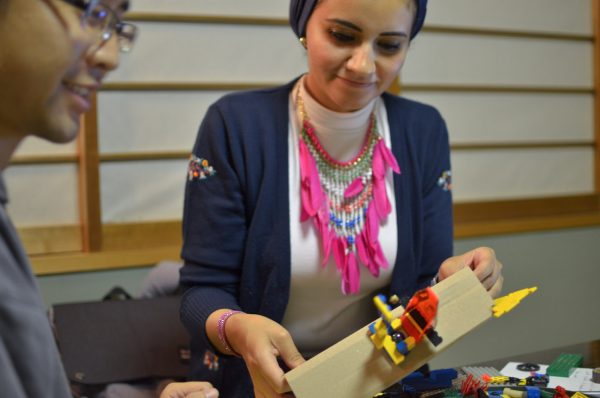
workshop1 _marikoji
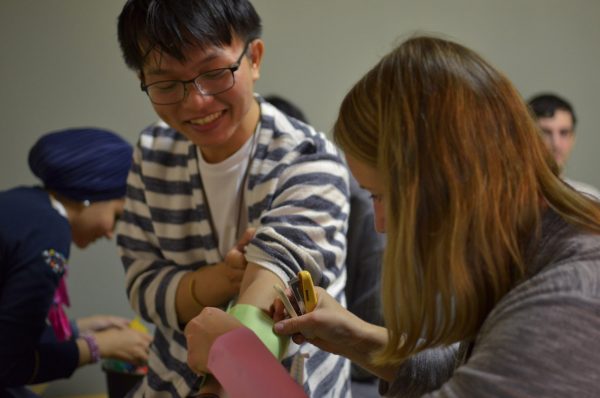
workshop1 _marikoji
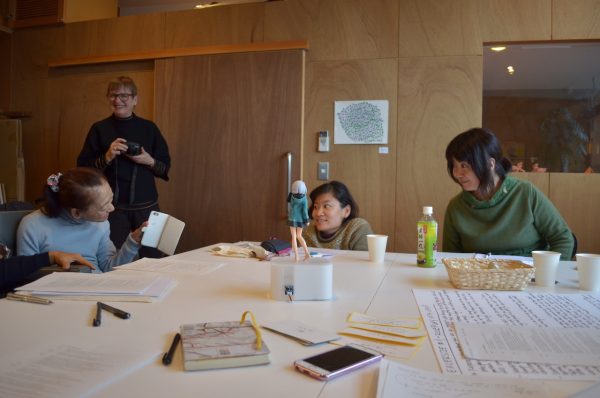
workshop1_tanpopo
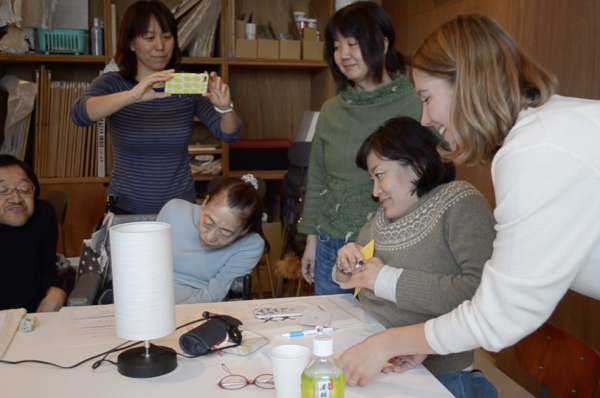
workshop1_tanpopo
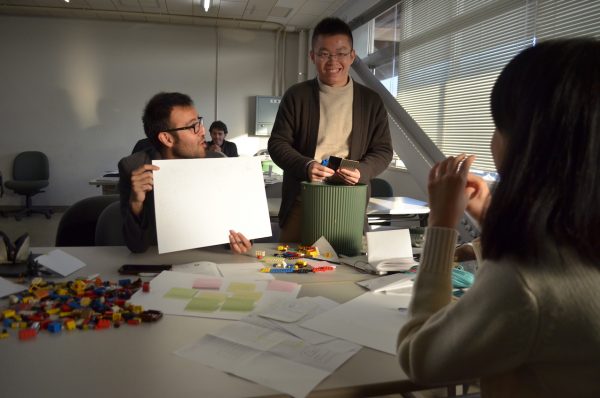
workshop1_KIT
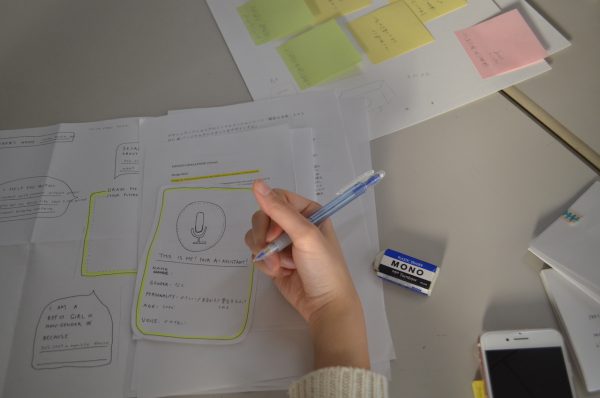
workshop1_KIT
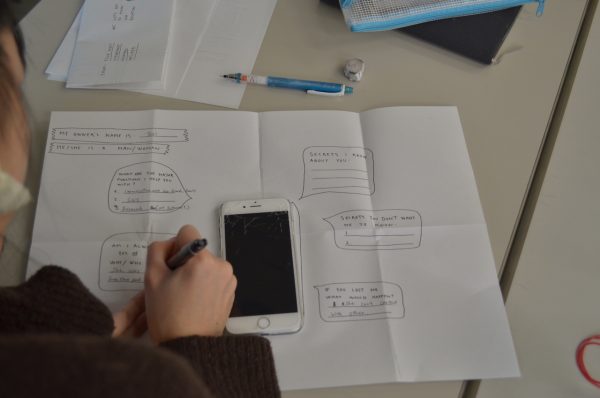
workshop1_KIT
Marie Louise Juul Søndergaard is a PhD student in interaction design at Aarhus University in Denmark. She is affiliated with the Digital Aesthetics Research Center, Center for Participatory IT, and the research unit Sexuality Studies. She has a Master in Digital Design from Aarhus University, has been a visiting scholar at Berlin University of Arts in Germany, and Umeå Institute of Design in Sweden.
Research Area
Marie Louise is researching intimate design and critical-feminist practices of intimate technologies. The goal of the PhD research is to explore the role of intimacy in a datafied culture, where more aspects of our everyday life are monitored and managed through algorithms. Throughout the PhD research, she has explored the social and cultural issues of new digital technologies in relation to gender, sexuality, and disability. The goal of research project conducted at Kyoto Design Lab is to examine and challenge how we design AI personal assistants. Marie Louise initiated the project in Denmark, and came to Japan to explore how a different cultural context would provide a new design perspective on personal assistants.
Workshops with KYOTO Design Lab
Marie Louise has conducted her research with supervision by Professor Julia Cassim and in collaboration with Tanpopo-no-ye and KIT design students. She has facilitated three workshops where the participants and herself imagine and design AI personal assistants. The first workshop was with international students at KIT’s Marikoji Kaikan and explored how personal assistants could help with personal issues. The second workshop was with the organization Tanpopo-no-ye, and explored how we can learn from the everyday lives of people with disabilities and their relationship with human assistants to design virtual assistants. The third workshop explored how personal assistants can help in situations of harassment, and was carried out together with KIT students in the elective course “Designing with people”, taught by Professor Julia Cassim and Professor Katsuhiko Kushi.
Design results
By carrying out a research project in Japan, Marie Louise has aimed to foreground the cultural nuances and differences between the paradigm of personal assistants designed in primarily Western cultures and the design principles that appeared throughout the collaboration with Tanpopo-no-ye and design students in the workshops. Marie Louise has used the insights from the workshops to develop three design proposals that challenge the assumptions embedded in AI personal assistants and imagine different ways of designing and using AI personal assistants. The three proposals include a toilet assistant that manage bodily fluids and pregnancy, a manga assistant that does not tolerate harassment, and two devices that let you hack your voice interaction with the personal assistant.

workshop1 _marikoji

workshop1 _marikoji

workshop1_tanpopo

workshop1_tanpopo

workshop1_KIT

workshop1_KIT

workshop1_KIT